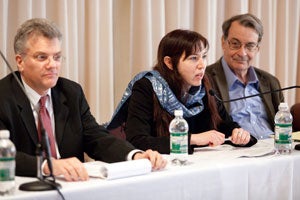The United States’ response to the 9/11 attacks has altered the legal landscape. That premise was outlined by William K. Lietzau, Deputy Assistant Secretary of Defense for Detainee Policy, in his keynote address at a conference titled “Understanding Detention and Predicting Prosecutions: Legal Challenges and Legislative Options Ten Years After 9/11.” The conference, sponsored by the National Security and Law Association, took place on February 4 at Harvard Law School and featured panel discussions focusing on prosecutions and detentions in the aftermath of 9/11.
In his remarks, Lietzau observed that the United States’ post-9/11 response has alienated many nations that once stood beside it on matters of national security and the uses of military force. He emphasized that the manner in which the U.S. takes up the challenge of establishing an effective legal regime could reflect the most enduring impact of the 9/11 attacks, because changes in the law often rank among the most noteworthy legacies of war.
VIDEO: View Lietzau’s address, “Twenty-First Century Detention for Terrorists”
“The legal regime that emerges from this era will likely alter for all time the way nations and states apply the rule of law in combating external, transnational terrorist threats,” he said. “If properly nuanced, this scheme could potentially maximize the likelihood of success in combating terrorism while preserving and protecting the human rights and civil liberties that define our society.”
Lietzau is optimistic that the US will find solutions to the problems associated with the detention of terrorists because the last decade of trial and error has provided the experience and insight that no single person or group could have provided independently. He emphasized the importance of adopting a legal regime that recognizes that insurgent belligerents captured as a function of the law of war are detained to mitigate their threat, not as a punishment for past crimes. But he also stated that such a regime should involve appropriate processes to ensure continued detention is warranted.
The Understanding Detentions panel, which was moderated by Columbia Law School Associate Professor of Law Matthew Waxman, included legal scholars as well as practitioners and addressed topics such as which institutions have the authority to detain suspects and what kinds of powers should those institutions have.
VIDEO: View the Understanding Detentions panel.
Benjamin Wittes of the Brookings Institution said that although the judiciary should play a role in the detention process, the federal district courts are currently facing too large a challenge because they have received very little guidance from the Supreme Court thus far. District courts are essentially designing the current detention rules but must do so not by asking “What would be a fair rule?” but by dealing ad hoc with the individuals and intelligence data presented to them in each case. While the courts are not doing a poor job, this process does not necessarily create ideal detention rules.
Other participants in the Understanding Detention panel included Major Robert Barnsby of the US Army JAG Legal Center and School, University of Texas School of Law Professor Robert Chesney, and Jamie Williamson of the International Committee of the Red Cross.
In the Predicting Prosecutions Panel, which was moderated by Harvard Law School Assistant Professor of Law Gabriella Blum, Ben Wizner of the ACLU said that the argument against bringing the suspected 9/11 conspirators to trial is based on the premise that the defendants can never be released even if they are acquitted, so a trial would just be a risky sham. But he said that the likelihood of the individuals not be convicted is extraordinarily low.
VIDEO: Watch the Predicting Prosecutions panel.
“I think it should go without saying that if secret prisons and brutal interrogations make prosecutions difficult, the problem is with secret prisons and brutal interrogations, and not with our justice system,” he said. “And with the proposal that we not even bring to justice and criminally punish the worst criminals in the history of our country, we’ve reached the bottom of a very slippery slope.”
Harvard Law School Professor Jack Goldsmith agreed that military detention for prisoners in Gitmo is imperfect, and said that there needs to be debate about the future of that system. But he emphasized that the President has legal authorities during times of war that include the power to detain people until the end of the conflict.
“The reality is that any government in this country is going to maintain the right to detain someone still deemed to be within the scope of the authorization to detain, and that’s just the reality demanded by national security,” he said.
 New York University School of Law Professor Richard Pildes said that the question to be debated is not whether the activity of suspected terrorists is a crime, but is instead whether certain circumstances, particularly military capture, create compelling justifications to use systems other than the traditional criminal justice system.
New York University School of Law Professor Richard Pildes said that the question to be debated is not whether the activity of suspected terrorists is a crime, but is instead whether certain circumstances, particularly military capture, create compelling justifications to use systems other than the traditional criminal justice system.
Harvard Law School Professor Philip Heymann agreed with Pildes’s point that the sentence structure should be based on the seriousness of the harm, the dangerousness of the person and the guilt of the action.
“My view on detention meshes with my view of military trials,” said Heymann. “You should detain for civilian trials unless someone is captured on the battlefield. I think the number of people involved [who are] not captured on the battlefield is likely to be small for a long period of time. The problem of not being able to gather evidence [for a trial] when we send Special Forces into Somalia is met by the fact that we shouldn’t be sending a Special Forces team into Somalia. We must have probable cause before we go in.”
